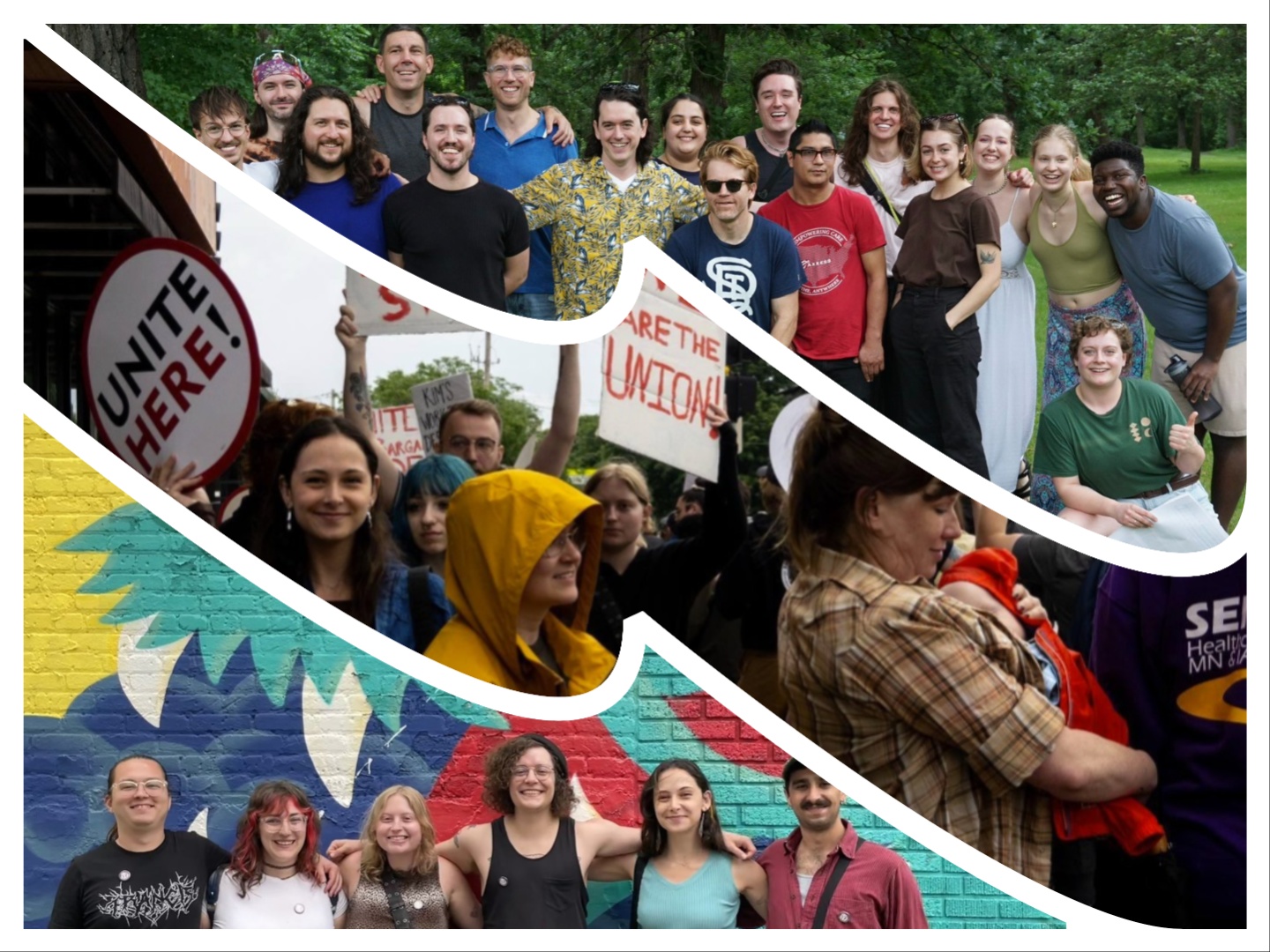This was supposed to be a high-wire story of labor vs. ownership, duking it out over their respective interests in the exciting, very public arena of higher-end Twin Cities dining.
In one corner, you’ve got the staff at buzzy Minneapolis restaurant Kim’s, who presented their James Beard Award-winning boss, Ann Kim, with news of their upstart union while the local newspaper snapped away at her reaction in real-time. Weeks later, workers at several outposts in Daniel del Prado’s growing Twin Cities empire, Colita and Café Cerés, gave their James Beard semifinalist boss the same news.
In the other corner, you've got Kim and del Prado, two of the most-acclaimed Twin Cities restaurateurs in recent memory.
Playing out in the background, you’ve got Minneapolis’s moderate mayor and progressive City Council agreeing on the creation of a Labor Standards Board, only to see the very idea of that seemingly anodyne oversight/recommendation body rejected by a who’s who of local owners, including Kim and del Prado. One member of the anti-Labor Standards Board coalition, commenting on hypothetical regulations the would-be board could theoretically enact, threatened to replace employees with QR codes; when encountering even the slightest whiff of worker advocacy, that's where restaurant owners seem to be at.
Instead of blow-by-blow accounts of these labor conflicts, Racket experienced mostly radio silence. Two PR representatives for Kim’s ignored interview requests. Emails to del Prado’s businesses went unanswered. Two Minneapolis City Council members didn’t respond to our messages. Ditto for the owners of two landmark Twin Cities restaurants—Jax Cafe in Minneapolis, Mancini's Char House in St. Paul—who’ve long managed workforces repped by hospitality union Unite Here Local 17, the umbrella under which Kim and del Prado workers are organizing.
As far we can tell, Kim and del Prado haven't addressed any news outlets directly over the past month or so. In Kim’s case, the hush-hush comms strategy proved a losing one; last week 65% of her workers who participated in a Nation Labor Relations Board election voted in the affirmative, thus certifying their 60ish-member bargaining unit. Del Prado who, like Kim, refused to voluntarily recognize his 90ish unionizing staffers, will see them vote later this summer.
To even feign interest in both-sidesing this report, we had to rely on leaked memos and distant press clippings to better understand the anti-union positions held by those at the upper echelon of the local dining universe. Workers from Kim’s, Colita, and Café Cerés, on the other hand, were eager to elucidate their arguments, and we found labor reporters, historians, and organizers who were happy to chime in, too.
That’s a whole lot of throat-clearing to say: If these types of stories rely almost exclusively on one perspective, as they often do, you can direct all further questions to the tight-lipped restaurant owners who refuse to state their cases—good luck, though! So here are the most compelling recent labor battles to emerge in Minneapolis, as told by those willing to put their voices on the record.
Organizing Where You Eat
Generally speaking, it has been a brutal half-century for trade unionism: Total U.S. union membership topped 30% in the 1950s, but through decades of Republican free-market zealotry, combined with Democratic-backed neoliberal free-trade initiatives, that number has dipped to just 10%. (Cue the graph.) In Minnesota, we keep creeping closer to the national average, with union membership falling from 14.2% to 13.3% between 2022 and 2023.
Gutted for decades, the historically unionized U.S. manufacturing sector offers few new leads for organizers. So the post-industrial labor movement is getting creative. You saw it in 2021, when unions began flexing muscle in new industries to the overwhelming approval of most Americans. The restaurant industry is notorious for tight margins, high failure rates, and severely limited worker protections. Only 1.4% of food/drink service workers are union members, according to the latest data from the U.S. Bureau of Labor Statistics. Viewed with surplus optimism, that's a lotta room for growth as the U.S. shifts more toward a service economy.
For Unite Here Local 17, which represents around 6,000 Minnesota hospitality workers at airports, hotels, stadiums, and restaurants, the nightlife scene represents an exciting opportunity to organize put-upon service workers whose indignation ramped up during the pandemic. The Minneapolis-based union has attempted to crack the craft beverage sector in recent years, with results as mixed as the drinks—major wins at Fair State Brewing and Indeed Brewing, major losses at Surly Brewing Co. and Spyhouse Coffee. Over the past year Unite Here successfully unionized around 200 workers at First Avenue’s network of music venues, and is now organizing the trendy restaurant space with Kim’s and the del Prado spots.
Sheigh Freeberg, secretary-treasurer of Unite Here Local 17, doesn’t differentiate between the workplace grievances at a posh Korean restaurant and, say, a hot dog cart at Target Field.
"Workers at some of the top hospitality companies in Minneapolis say the issues they’ve experienced at their current jobs are the same ones they’ve struggled with throughout their careers, regardless of the prestige of the restaurant," Freeberg reports. "Restaurant workers care about hospitality—they take pride in preparing food, mixing drinks, making sure guests have an incredible night. But workers are tired of an industry they’ve made careers in treating them like they shouldn’t expect much in return. We have a hospitality economy, and hospitality should be a real career. Workers know it can be."
Freeberg’s 300,000-member organization came about with the 2004 merger of Union of Needletrades, Industrial, & Textile Employees (UNITE) and Hotel Employees & Restaurant Employees Union (HERE). In 1934, George Naumoff founded the HERE Local 665 while working as a freight-elevator operator at the Minneapolis Athletic Club. Born in Macedonia in 1896, the 40-year local leader of HERE inherited radical sympathies from his mother, who was a supporter of the revolutionaries fighting Turkish soldiers during his youth, per his 1987 Star Tribune obituary. Naumoff immigrated to the U.S. by himself at 14 (!), and through the 20th century his union would prove integral in “transforming Minneapolis from an anti-union stronghold into a well-unionized city,” according to labor historian Peter Rachleff.
Locally, Rachleff says HERE has been a historic force in the labor movement: helping propel civil rights pioneer Nellie Stone Johnson, joining the labor and civil rights movements under the North Central Voters League umbrella, and helping spur the modern immigrant-rights movement during 2000’s widespread downtown Minneapolis hotel strikes.
“Here in Minnesota, HERE has played an integral role every time the labor movement has surged forward, especially when the rights and participation of women and workers of color have been front and center," says Rachleff, a former Macalester College professor and co-founder of the East Side Freedom Library. "It is not at all surprising that hotel and restaurant workers are critical participants in this upsurge of new energy in the labor movement.”
Hamilton Nolan, one of the last remaining full-time U.S. labor reporters, also isn’t surprised to hear about Unite Here’s organizing plays at places with $30 entrees and $16 cocktails.
“Unite Here locals in a lot of cities think really strategically about how to build power in the hospitality sector, specifically, so it's not surprising that Unite Here would be doing this,” says the In These Times and Guardian writer, whose book, The Hammer, dropped earlier this year. “Restaurants have always been a hard industry for unions to crack because of high turnover and other things, so it makes sense that they would start at the high end, which is a little more stable, and try to build out from there.”
In terms of prestige, Kim and del Prado are at the highest of the high end. You really can’t overstate the volume of press adulation they've received in our oft-incestuous food/drink media realm. These recent waves of union headlines? They set the table (restaurant term) for both obstinate owners to face public blowback for the first time.
A Labor Win at Kim’s
Until last month, Ann Kim seemed immune to anything approaching negative PR. Fourteen years ago alongside her future husband and CFO, ex-finance executive Conrad Leifur, Kim launched Pizzeria Lola in south Minneapolis. The pizza was a smash hit, drawing praise from high (Food & Wine magazine) and low (populist food dude Guy Fieri).
Kim’s childhood immigration story from South Korea seemed made for TV, and that’s exactly what happened when Netflix’s popular Chef’s Table series devoted a 2022 episode to Kim’s journey, which by then included more restaurants (Hello Pizza, Young Joni, Sooki & Mimi) and a James Beard Award (2019 Best Chef: Midwest).
Launched late last year to replace Sooki & Mimi, Kim’s in Uptown felt like a victory lap for a restaurateur the New York Times once declared “a star of the vibrant Minneapolis restaurant scene.” But, earlier this year, labor tensions began bubbling beneath the surface at Kim’s.
At issue, according to workers like Kaylee Murphy, a server/bartender who started at Sooki & Mimi and now works at Kim's: irregular hours, a no-tipping service charge that reportedly cuts deep into pay, and, generally, a desire to have a voice in the workplace.
"My schedule isn't, like, 3 to 10 p.m.—it's usually 3 p.m. to B.D., which means ‘business decline,’” says Murphy, who has worked for 20 years in the Twin Cities service industry. “There's no consistency… I'm either working a part-time job or a full-time job, depending on the week."
When business owners encounter unionizing workforces, they can voluntarily recognize the union and begin the process of negotiating a first contract in good faith. Or, they can test the chaotic route Ann Kim chose. Kim’s lone public statement came shortly after her workers’ union went public on May 28. “I wholeheartedly believe we can do this together without a union," she wrote in a statement issued by Blois Olson—the prominent local PR man who helped fight Spyhouse’s union and represented Uber during the recent clash between rideshare companies and drivers. Kim’s personal and business social media accounts went, and remain, private.
The clearest glimpse at how Kim viewed labor wouldn’t come from her in-house comms team at Vestalia Hospitality or, certainly, from Blois Olson. It came late last month, days before the NLRB vote, when popular Minnesota-based dining industry observer Joe Rosenthal posted leaked messages from Ann Kim and her team that were sent to cooks, dishwashers, servers, hosts, and bartenders. (Click here to see Rosenthal scrapping via DMs with Olson.) You could describe the tone of the messages as explicitly, even frantically, anti-union.
- "Union activity can make it rough to go to work," reads one message.
- "It feels stressful having us divided in a way we've never seen before (it may get worse if the union is voted in)," reads another.
- "During this chaotic time, we still see many of you working incredibly hard to give a great experience to our guests," reads yet another. "Honestly, it has been tough to be a manager at Kim's during this period. We also see how hard it is to be a nonunion supporter and show up every day ready to work."
Ultimately, the messaging blitz that Unite Here Local 17 characterized as “a persistent anti-union campaign by the employer to encourage a ‘no’ vote” failed. Forty-eight ballots were cast by 52 eligible workers, with only 17 of them opposing the union. Up next: Collectively bargaining across the table from Kim for that first contract.
"I love Uptown, and I was really excited about bringing new business into the area. I care enough to make a change, things do need to change, and this is the way to do it,” Murphy says, adding that staffers have been “energized” by neighborhood support. “A job is a job, and we deserve respect regardless of industry—this is my career and I love it. Let's just have a seat at the table."
Dueling with del Prado
Server Todd Kohn offers up a weary chuckle. Yes, he’s familiar with that quote; everyone working at Colita seems to be.
It’s the one that caps a glowing and thorough Twin Cities Business profile of Daniel del Prado, headlined: "Daniel Del Prado’s Growing Culinary Empire: He's rapidly become the Twin Cities' largest restaurateur, with an appetite for more. How many plates can he spin at once?"
The story begins with a scene of del Prado zooming around Edina in his black Porsche Carrera, and it concludes with the Argentine immigrant who’d go on to launch Colita, Café Ceres, Cardamom, Martina, and other hot spots declaring...
“I love capitalism. I love Adam Smith.”
(In fairness, it'd be even more noteworthy if the local food tycoon had shouted "I love democratic socialism! I love Rosa Luxemburg!")
Other pro-capital quotes from the sleeve-tattooed Isaac Becker protégée include: “I like rich people," "My main focus is growth,” and “I am terrified of not having money."
Those past press clippings are the only clues we have on del Prado’s mindset about workers at Colita and four Café Cerés locations joining Unite Here Local 17 three weeks ago. Unlike Kim, he hasn’t uttered a public peep—through social media, through the press, through PR machinery—about the organizing happening inside his restaurants.
Inside DDP Restaurant Group, del Prado has been much more vocal, according to Unite Here Local 17 communications specialist Allyssa Pollard. She says DDPRG has quietly rejected a “supermajority” of workers seeking voluntary union recognition.
“At Colita, the company has begun a classic anti-union campaign,” Pollard reports, “starting with management speeches encouraging a vote against unionization, distributing anti-union materials, and hiring counsel with expertise in union avoidance.”
Kohn, a server at Colita for the past three years, says there’s a “long list” of worker grievances, including wages and benefits, irregular hours, understaffing, and improperly stocked materials. Over at Café Cerés, lead barista Mariam Karkache echoes those concerns.
"The organizing kinda started naturally, talking about the good, the bad, and the ugly of our shifts," Kohn says. "Then the conversations shifted: What if we could change this, make it a better situation? I’ve worked in the Twin Cities service industry for over 10 years; we’re so interwoven into the fabric of the city. All of this is designed to help everyone succeed.”
Karkache says Café Cerés workers are feeling the love from regulars. A group of Minneapolis community leaders have organized, semi-formally, to voice their support of the Cerés and Colita union drives. They did the same for Kim’s.
"This new wave of industry organizing is long overdue—this is our livelihood," Karkache says. "You form relationships with your daily guests, and they're really happy that we feel empowered to stand up for ourselves and ask for a seat at the table."
Kohn and Karkache both dismiss any notion that they’re risking bankrupting their Wealth of Nations-reading boss. Del Prado’s various ventures haul in almost $40 million per year, according to that memorable TCB profile. "We're not coming from a selfish place, we just want to create a better cafe that other businesses can model," Karkache says.
The future look of del Prado’s empire will come into clearer focus soon. Colita workers are voting through the NLRB on July 18; Unite Here Local 17 is in the process of scheduling an election for Café Cerés workers.
"I feel more solidarity now with my coworkers than ever,” Kohn says. “When I need help at work, it's my coworkers who are helping me. My coworkers have my back, whenever I'm stressed, busy, or overworked. Now, through us forming this union, it's just another aspect of having each other's backs."






